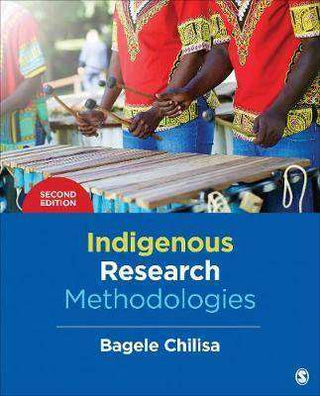Indigenous Research Methodologies
- Unit price
- / per
-
Author:CHILISA Bagele
-
ISBN:9781483333472
-
Publication Date:February 2020
-
Edition:2
-
Pages:392
-
Binding:Paperback
-
Publisher:Sage Publications
-
Country of Publication:United Kingdom


A Back Order button means that we don’t have the book in stock at our store. It may already be on order – or we can order it for you from a publisher or distributor at no additional cost.
As we source items from around the globe, a back-order can take anywhere from 5 days to several weeks to arrive, depending on the title.
To check how long this might take, you’re welcome to contact us and we can provide an ETA or any other information you need. We recommend checking the timeframe before committing to an online order.
Indigenous Research Methodologies
- Unit price
- / per
-
Author:CHILISA Bagele
-
ISBN:9781483333472
-
Publication Date:February 2020
-
Edition:2
-
Pages:392
-
Binding:Paperback
-
Publisher:Sage Publications
-
Country of Publication:United Kingdom
Description
This second edition situates research in a larger, historical, cultural and global context, addressing the increasing emphasis in the classroom and in the field on sensitising researchers and students to diverse perspectives--especially those of women, minority groups, former colonized societies, indigenous people, historically oppressed communities, and people with disabilities.
Chapters cover the history of research methods, ethical conduct, colonial and postcolonial epistemologies, relational epistemologies, emergent and indigenous methodologies, Afrocentric research, feminist research, narrative frameworks, interviewing, and participatory methods.
Additional information on indigenous quantitative research reflects new developments in the field. New activities and web resources offer more depth and new ways for students to extend their knowledge. This textbook includes features such as key points, learning objectives, student exercises, chapter summaries, and suggested readings, making it an ideal textbook for graduate-level courses.
Adding product to your cart
You may also like
A Back Order button means that we don’t have the book in stock at our store. It may already be on order – or we can order it for you from a publisher or distributor at no additional cost.
As we source items from around the globe, a back-order can take anywhere from 5 days to several weeks to arrive, depending on the title.
To check how long this might take, you’re welcome to contact us and we can provide an ETA or any other information you need. We recommend checking the timeframe before committing to an online order.
You may also like
You may also like
-
This second edition situates research in a larger, historical, cultural and global context, addressing the increasing emphasis in the classroom and in the field on sensitising researchers and students to diverse perspectives--especially those of women, minority groups, former colonized societies, indigenous people, historically oppressed communities, and people with disabilities.
Chapters cover the history of research methods, ethical conduct, colonial and postcolonial epistemologies, relational epistemologies, emergent and indigenous methodologies, Afrocentric research, feminist research, narrative frameworks, interviewing, and participatory methods.
Additional information on indigenous quantitative research reflects new developments in the field. New activities and web resources offer more depth and new ways for students to extend their knowledge. This textbook includes features such as key points, learning objectives, student exercises, chapter summaries, and suggested readings, making it an ideal textbook for graduate-level courses.
-
-
Author: CHILISA BageleISBN: 9781483333472Publication Date: February 2020Edition: 2Pages: 392Binding: PaperbackPublisher: Sage PublicationsCountry of Publication: United Kingdom
This second edition situates research in a larger, historical, cultural and global context, addressing the increasing emphasis in the classroom and in the field on sensitising researchers and students to diverse perspectives--especially those of women, minority groups, former colonized societies, indigenous people, historically oppressed communities, and people with disabilities.
Chapters cover the history of research methods, ethical conduct, colonial and postcolonial epistemologies, relational epistemologies, emergent and indigenous methodologies, Afrocentric research, feminist research, narrative frameworks, interviewing, and participatory methods.
Additional information on indigenous quantitative research reflects new developments in the field. New activities and web resources offer more depth and new ways for students to extend their knowledge. This textbook includes features such as key points, learning objectives, student exercises, chapter summaries, and suggested readings, making it an ideal textbook for graduate-level courses.
-
Author: CHILISA BageleISBN: 9781483333472Publication Date: February 2020Edition: 2Pages: 392Binding: PaperbackPublisher: Sage PublicationsCountry of Publication: United Kingdom
-




